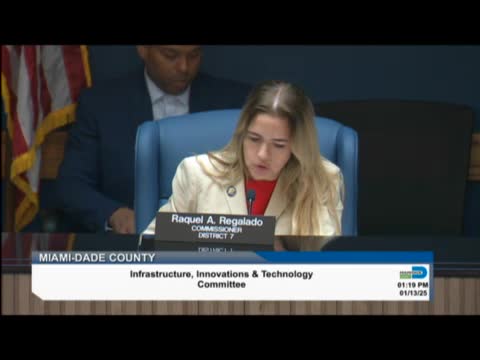Committee backs $3 million match to test new biosolids technology amid rising disposal costs
Get AI-powered insights, summaries, and transcripts
Subscribe
Summary
Miami-Dade County committee approved seeking a $3 million federal match to test a vendor27s biosolids treatment technology after members raised alarm about emergency backups and rising per-ton disposal costs in the South district.
Miami-Dade County27s Infrastructure Innovation and Technology Committee voted to pursue a $3 million local match to apply for a federal Environmental Protection Agency grant to test a vendor27s biosolids treatment technology, after members described current emergency disposal conditions and sharply higher contractor prices.
The request, described to the committee as an initial investment to qualify for a multi-phase EPA program, will fund a demonstration intended to prove the vendor27s process works before any county funds would be released. If the demonstration is successful, officials said the project could move to a second phase that supporters expect to be a roughly $100 million build-out with federal and private cost-sharing.
Committee members said the county faces immediate public-health and odor problems in the South District and that disposal prices have risen rapidly. The county27s director and staff told the committee that costs have climbed from roughly $57 per ton before last year27s state rule changes to $102 per ton for some loads handled by Compost USA and that emergency contracts and recent bids suggest future costs could be in the $15024200-per-ton range.
Chairwoman Regalado opened the item and framed the county27s interest in pursuing federal funding for an innovative treatment that would thermally process biosolids into a fuel. Committee members said the county needs to test the technology quickly because they expect EPA regulation of PFAS (per- and polyfluoroalkyl substances) to make current disposal approaches far more expensive or impracticable.
The director27s staff explained the proposed sequence: the county would contribute $3 million to qualify for a matching $3 million federal award and a two-year development period for concept, budget and design. If phase one demonstrates the technology works, phase two was described as a roughly $100 million project split roughly $50 million federal, $50 million private and taking several years to build. Staff said the vendor has agreed to demonstrate the technology in March and that the county would require a successful proof-of-concept before any funds were released.
Commissioner Cohen Higgins pressed staff for clarity about where the $3 million would come from, noting the sum was not included in the current budget. Other commissioners emphasized that the county currently faces an emergency backlog in the South District, where residents have reported offensive odors, and asked staff to expedite separate emergency procurement so current accumulation can be removed while the grant work proceeds.
Officials said Compost USA is currently accepting roughly half of the county27s biosolids at about $102 per ton for materials from the Central District. For the South District, staff said they are operating under a temporary emergency contract and that recent bids for longer-term disposal ranged significantly, with the lowest estimates translating to approximately $15024200 per ton.
Staff also said that intellectual property rights were drafted in the vendor27s proposal to make the technology the county27s property if the work proceeds under the proposed matching grant; the committee was told those ownership and licensing specifics would be negotiated in any subsequent agreement.
After the discussion, a motion to move the item passed on a voice vote. Committee members requested that the county require the demonstration before any match funds are released and that procurement staff accelerate emergency measures to relieve current backups.
County staff said they will continue working on funding identification before the item goes to the full Board of County Commissioners and that the demonstration would occur before the federal match is accepted.
